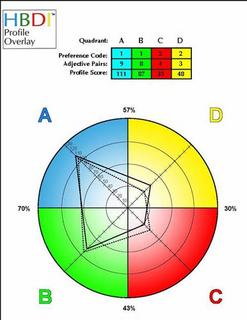HBDI

Okay, so when I was a senior in college, I took this amazing class called Imagination as part of my Entrepreneurship major. I know it sounds like some rocks-for-jocks type deal, but it actually was quite insightful and interesting. During the class we each took a test called the HBDI. Below is the interpretation of my results by my professor, Dr. M. Sonneborn. The graphic to the left is an example from the website of what the profile output looks like.
~~
You are triple dominant with a clear preference for organization and stability. You are also interested in reducing risks in decisions, liketo stay within budgets, and are able to function well within step-by-step agendas or implementation plans.
Your adjective pairs show that your back-up strategy (under stress) is the same as your normal strategy for dealing with decisions, issues, people, etc. Therefore, when you are under stress, you may need to tell colleagues that they need to leave you alone - since you don't let off clues that are different than when things are calm and relaxed.
Safety and security are likely to be important to you also. You probably look at safety features in cars before purchasing, and take into account risks when doing things like sky-diving - though you may steer far away from extreme sports and putting yourself in physical danger. However,if someone convinced you that the risk of physical harm was low, you might try it, especially if a group of friends wanted to try it (your red quadrant creeping in).
Right after the green quadrant, the red is your preference (human culture and issues, sensory and emotive). That is the strategy you move to after addressing issues with your organizational and safekeeping preference. Then you probably focus on how people feel about decisions and issues.
Your third preference is visionary, futuristic, and the ability to take risks after you have assessed them. You do not avoid analytical issues, but if there was a type of person in the work place with whom you might not agree, it would likely be ananalytical, past-oriented, statistics or data-driven person.
~~

0 Comments:
Post a Comment
Subscribe to Post Comments [Atom]
<< Home